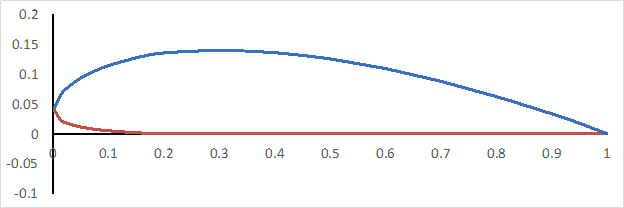Clark Y-14 Wing Performance: Deployment of High-lift Devices (Flaps and Slats)
Source: David Guo, College of Engineering, Technology, and Aeronautics (CETA), Southern New Hampshire University (SNHU), Manchester, New Hampshire
A wing is the major lift-generating apparatus in an airplane. Wing performance can be further enhanced by deploying high-lift devices, such as flaps (at the trailing edge) and slats (at the leading edge) during takeoff or landing.
In this experiment, a wind tunnel is utilized to generate certain airspeeds, and a Clark Y-14 wing with a flap and slat is used to collect and calculate data, such as the lift, drag and pitching moment coefficient. A Clark Y-14 airfoil is shown in Figure 1 and has a thickness of 14% and is flat on the lower surface from 30% of the chord to the back. Here, wind tunnel testing is used to demonstrate how the aerodynamic performance of a Clark Y-14 wing is affected by high-lift devices, such as flaps and slats.

Figure 1. Clark Y-14 airfoil profile.
- For this procedure, use an aerodynamics wind tunnel with a test section of 1 ft x 1 ft and a maximum operating airspeed of 140 mph. The wind tunnel must be equipped with a data acquisition system (able to measure angle of attack, normal force, axial force and pitching moment) and a sting balance.
- Open the test section, and install the wing on the sting balance. Start with clean wing configuration.
- Place a handheld inclinometer on the sting balance, and adjust the pitch angle adjustment knob to set the sting balance
The results of the clean wing configuration are shown in Table 1. Figures 6 - 8 show all three coefficients vs angle of attack, α, for all four configurations. From Figure 6, both the flap and slat enhanced the lift coefficient, but in different ways. Comparing the clean wing and the slat lift curve, the two curves are almost overlapping at low angles of attack. The clean wing lift curve peaks to about 0.9 at 12°, but the slat curve continues to rise to 1. 4 at 18°. This in
Lift generation can be enhanced by the deployment of high-lift devices, such as flaps and slats. Most airplanes are equipped with flaps, and all commercial transport airplanes have both flaps and slats. It is critical to characterize the performance of a wing with flaps and slats during aircraft development.
In this demonstration, a Clark Y-14 wing with a flap and a slat was evaluated in a wind tunnel. The forces and moment measurements were collected to determine the lift, drag and pitching m
- John D. Anderson (2017), Fundamentals of Aerodynamics, 6th Edition, ISBN: 978-1-259-12991-9, McGraw-Hill
pringen zu...
Videos aus dieser Sammlung:

Now Playing
Clark Y-14 Wing Performance: Deployment of High-lift Devices (Flaps and Slats)
Aeronautical Engineering
13.2K Ansichten

Aerodynamisches Verhalten eines Modellflugzeugs: Die DC-6B
Aeronautical Engineering
8.1K Ansichten

Charakterisierung von Propellern: Variationen von Pitch, Durchmesser und Blattzahl, und deren Einfluss auf die Leistung
Aeronautical Engineering
26.0K Ansichten

Verhalten der Tragflächen: Druckverteilung über einem Clark Y-14-Flügel
Aeronautical Engineering
20.8K Ansichten

Turbulence Sphere-Methode: Bewertung der Strömungsqualität im Windkanal
Aeronautical Engineering
8.6K Ansichten

Querzylindrische Strömung: Messung der Druckverteilung und Einschätzung des Strömungswiderstandskoeffizient
Aeronautical Engineering
16.1K Ansichten

Analyse einer Düse: Variationen in Machzahl und Druck entlang einer konvergierenden und einer konvergierend-divergierenden Düse
Aeronautical Engineering
37.7K Ansichten

Schlieren-Imaging: Eine Technik zur Visualisierung der Eigenschaften von Überschallströmungen
Aeronautical Engineering
11.2K Ansichten

Strömungsvisualisierung in einem Wassertunnel: Beobachtung des Vorderkantenwirbels über einem Deltaflügel
Aeronautical Engineering
7.8K Ansichten

Surface Dye Flow Visualisierung: Eine qualitative Methode zur Beobachtung von Stromlinien in Überschallströmungen
Aeronautical Engineering
4.8K Ansichten

Pitotrohr: Ein Gerät zur Messung der Luftströmungsgeschwindigkeit
Aeronautical Engineering
48.4K Ansichten

Konstant-Temperatur-Anemometrie: Ein Werkzeug zur Untersuchung der turbulenten Grenzschichtströmung
Aeronautical Engineering
7.1K Ansichten

Druckwandler: Kalibrierung mit einem Pitotrohr
Aeronautical Engineering
8.4K Ansichten

Echtzeit-Flugsteuerung: Eingebettete Sensorkalibrierung und Datenerfassung
Aeronautical Engineering
10.0K Ansichten

Multicopter-Aerodynamik: Charakterisierung der Schubkraft bei einem Hexacopter
Aeronautical Engineering
9.0K Ansichten
Copyright © 2025 MyJoVE Corporation. Alle Rechte vorbehalten